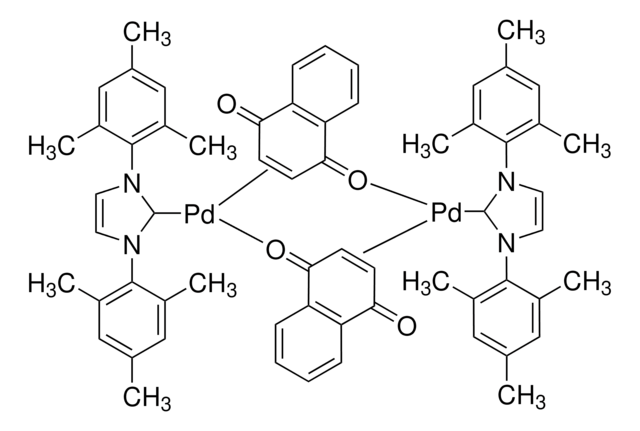reaction suitability
core: palladium
reaction type: Buchwald-Hartwig Cross Coupling Reaction
reaction type: Heck Reaction
reaction type: Hiyama Coupling
reaction type: Negishi Coupling
reaction type: Sonogashira Coupling
reaction type: Stille Coupling
reaction type: Suzuki-Miyaura Coupling
reagent type: catalyst
functional group
phosphine
storage temp.
2-8°C
General description
Application
Kit Components Also Available Separately
- 205869Palladium(II) acetate, reagent grade, 98% 1 gSDS
- 208671Bis(triphenylphosphine)palladium(II) dichloride, 98% 1 gSDS
- 216666Tetrakis(triphenylphosphine)palladium(0), 99% 1 gSDS
- 222380Allylpalladium(II) chloride dimer, 98% 1 gSDS
- 328774Tris(dibenzylideneacetone)dipalladium(0), 97% 1 gSDS
- 379670[1,1′-Bis(diphenylphosphino)ferrocene]dichloropalladium(II), complex with dichloromethane 1 gSDS
- 205885Palladium(II) chloride, ReagentPlus®, 99% 1 gSDS
Signal Word
Danger
Hazard Statements
Precautionary Statements
Hazard Classifications
Acute Tox. 4 Dermal - Acute Tox. 4 Inhalation - Acute Tox. 4 Oral - Aquatic Acute 1 - Aquatic Chronic 1 - Eye Dam. 1 - Met. Corr. 1 - Skin Irrit. 2 - Skin Sens. 1 - STOT SE 3
Target Organs
Respiratory system
Storage Class Code
6.1C - Combustible acute toxic Cat.3 / toxic compounds or compounds which causing chronic effects
WGK
WGK 3
Certificates of Analysis (COA)
Search for Certificates of Analysis (COA) by entering the products Lot/Batch Number. Lot and Batch Numbers can be found on a product’s label following the words ‘Lot’ or ‘Batch’.
Already Own This Product?
Find documentation for the products that you have recently purchased in the Document Library.
Customers Also Viewed
Our team of scientists has experience in all areas of research including Life Science, Material Science, Chemical Synthesis, Chromatography, Analytical and many others.
Contact Technical Service



